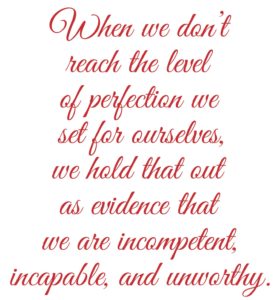Blog
The Imposter Syndrome Strikes Again

Imposter Syndrome
I went by the name Pamela Addams for more than eight years. It wasn’t my maiden name or my married name; it was my undercover name.
When you’re selected to be a part of the undercover drug unit you choose an alias that’s easy to remember, many undercover officers keep their first name and adopt a new surname. Some select the name of the first person they arrested, their grandma’s maiden name, their favorite singer or author, any name that they can easily remember.
I chose Addams as my surname because I felt a certain kinship with the Addams family. Uncle Fester, Cousin Itt. Look deep enough, and they’re likely in your family too.
When I was Pamela Addams, it was my job to pretend to be someone I wasn’t. It was actually kind of liberating to “be” someone else for months at a time. I didn’t have to be “me” which meant I could let go of feeling like I was “less than” for a while.
The Real Me
 When I was being the real me, I was attending law school, completing my Master’s Degree, and working long days away from home for months at a time. When I was being me during all of these instances, and many more, I felt like I was a pretender, and I’m not talking about a cool Pretender like Chrissie Hynde.
When I was being the real me, I was attending law school, completing my Master’s Degree, and working long days away from home for months at a time. When I was being me during all of these instances, and many more, I felt like I was a pretender, and I’m not talking about a cool Pretender like Chrissie Hynde.
I would tell myself things like, “Well, of course, I was accepted into law school because it’s easier for thirty-year-old women to gain admission, they have to accept “old” people. Yes, when I was thirty, I thought that was old.
The Master’s Degree, come on, it wasn’t a Ph.D. program for Pete’s Sake, anyone can do that. Working weeks away from home, easy peasy lemon squeezy because I didn’t have kids, I was only in law school full-time.
The Fraud Police Are Coming 🚓
During all of this, I kept waiting for the fraud police to break down my door because they’d finally found out that I wasn’t capable of any of this. Or, so I believed. I still believe it sometimes.
I’ve done a lot of work on me, and I don’t feel like a fraud nearly as much as I used to. However, every once in a while I catch myself wondering,
“Who the hell am I to talk about this…?! I’m just a mom. I’m not an expert!”
That’s what keeps blogs hidden in a secret file on my computer. It’s what keeps a book buried inside of me instead of on the pages for people to read. What if “they” find out I don’t know what I’m talking about?
All that, a bag of chips, and an imposter
I’ve come to realize that it doesn’t matter how many degrees you have, what your experience is, how much you’ve accomplished or what other people think, you can still feel like an imposter.
Feeling like an imposter can keep you awake at night wondering if this will be the day that the fraud police kick in your front door because they’ve finally figured out that you don’t know what the hell you’re doing.
So to prevent that door kick you take jobs and assignments below your abilities, you pass on the opportunity of a lifetime, you abandon your dreams of writing, or singing, or starting a business because you don’t believe you’re qualified.
It doesn’t matter that people tell you how talented, smart, and gifted you are. They don’t know that when you feel like an imposter, it doesn’t matter that everyone around you thinks you’re terrific. What matters is what you believe.
Perfection doesn’t exist
Too often we hold ourselves to an unachievable standard that no one could ever reach: except those perfect people on Instagram – the ones who can match their aura with the cushions on their picture-perfect sofa – the one that the dog never jumps up on.
The truth is, we don’t have to look far (find your closest mirror) to see an  intelligent, competent, amazing woman who feels anything but smart, competent, and amazing.
intelligent, competent, amazing woman who feels anything but smart, competent, and amazing.
But over the years we’ve internalized ideas about what it means to be considered qualified, talented, and skilled. And that woman staring back at us in the mirror has decided that our good enough is never good enough.
How you view yourself is more important than anything when it comes to trusting yourself. Intellectually you know this, but it’s still hard to believe sometimes.
Ask yourself the following questions (don’t worry high-achievers, this isn’t a graded test):
- Do you believe that your success is because of some outside force (luck, timing, place, whom you know)?
- When someone compliments you do you reply with “Thanks but… If I can do it anyone can… or Thanks but it wasn’t that hard… Thanks, but I had some help… Thanks but…”?
- Do you see constructive feedback as evidence that you don’t know what the hell you’re doing?
- When you succeed, do you feel like you don’t deserve it or the credit belongs to someone else?
- Do you lie awake at night worried that it’s only a matter of time before the fraud police kick in your door?
If you answered yes to any of those questions, I’d like to introduce you to your alias, and she’s far worse than Cousin Itt. Meet the imposter syndrome.
Dr. Pauline Rose Clance and Dr. Suzanne Imes first described the imposter syndrome in the 1970s:
Despite outstanding academic and professional accomplishments, women who experience the imposter phenomenon persist in believing that they are really not bright and have fooled anyone who thinks otherwise. Numerous achievements, which one might expect to provide ample objective evidence of superior intellectual functioning, do not appear to affect the imposter belief.
In other words, no matter how many times you kick ass and rock the world, you’re unable to accept and acknowledge how friggin’ impressive you are!
It may seem counterintuitive, but imposter syndrome isn’t associated with low self-esteem or a lack of success. In fact, people we respect and admire like Maya Angelou, Sheryl Sandberg, and Tina Fey have all wondered when they would be discovered as frauds.
Tina Fey’s interpretation really hit home for me when she said, “The beauty of the impostor syndrome is you vacillate between extreme egomania and a complete feeling of: ‘I’m a fraud! Oh God, they’re on to me! I’m a fraud!’ So you just try to ride the egomania when it comes and enjoy it, and then slide through the idea of fraud.”
Imposter syndrome affects 70% of men and women.
Although, how it affects them is very different — women who have imposter syndrome work harder to prove themselves. Men, on the other hand, avoid situations where their weaknesses could be exposed.
It doesn’t matter that on the outside we have advanced degrees, amazing talents, impressive resumes, and happy relationships. Because on the inside, we’re insecure and we can’t figure out how to stop beating ourselves up over just about everything.
Deep down we just want to figure this stuff out so we can get on with enjoying our lives.
So what’s keeping us from feeling like the success we really are?
It’s that voice inside that keeps telling us that we’re not enough, or we’re too much, or some screwed up combination of both.
It all boils down to us not trusting ourselves, even when we have overwhelming evidence giving us every reason to believe in our capabilities.
8 Ways to Overcome Imposter Syndrome
1) Recognize feeling this way is normal
Like undercover work, the imposter syndrome relies on secrecy, and that’s why we don’t realize how many people are feeling the same way. If you have supportive people in your life, talk to them. Talking about it helps eliminate the secrecy that feeds imposter syndrome, and you give the other person permission to do the same.
2) Own your successes
Step up and accept that you’ve played a starring role in your success. You may have had an opportunity present itself at the perfect time, or someone introduced you to an influencer, or a unicorn gave you a gift. Who cares? So have a lot of other people who didn’t take action. Own it. You deserve it!
3) Control your thoughts
Use the force young Jedi. Whenever self-doubt or criticism enters your mind, focus on one of your strengths or accomplishments instead. You’ll never destroy the Death Star if you stay focused on your X-Wing’s faulty guidance system. Yes, I did it. I referenced Star Wars. “Do. Or do not. There is no try”.
4) Let go of perfectionism
Repeat after me. It will never be perfect. I will never be perfect. Nobody is perfect. Perfectionism is the path to the dark side. Okay, I promise I’ll stop, no more Yoda.
5) Create an “I Kickass File”
Screenshot the cool texts, DMs and posts people write to you. Print off the emails, save the letters and cards that say thanks and ‘you’re fantastic’. Keep them all in a file or box and have a look at them when you need to be reminded about the positive influence you’ve had on people.
6) Phone a friend
Next time you feel like a fraud, remind yourself that it’s only a feeling. But sometimes you need someone else to tell you that. Phone a friend and let them know you feel like the fraud police are closing in and you need them to bail you out.
7) She’s great and so are you
It’s easy to feel like you’re the imposter when you see everyone’s perfect life on social media. However, you only see the parts they want you to see. Every single person is vulnerable in some way, even if they don’t show it. You would probably be surprised at how many people you admire are also suffering from imposter syndrome.
8) You’ve got this
Recognize that life is not a dress rehearsal. Imagine what it would be like to look back at a life un-lived. Suddenly, feeling like an imposter is nothing compared to feeling like you didn’t even try.
Conclusion
Remember, that being successful and accomplished means that you will likely have the very normal feelings that you’re not. There’s nothing unusual about self-doubt.
I am not perfect. Neither are you. I am not an imposter. Neither are you. We’re all flawed and vulnerable, but that doesn’t make us imposters, it makes us brave, worthy, and human.
Connect on Social Media
